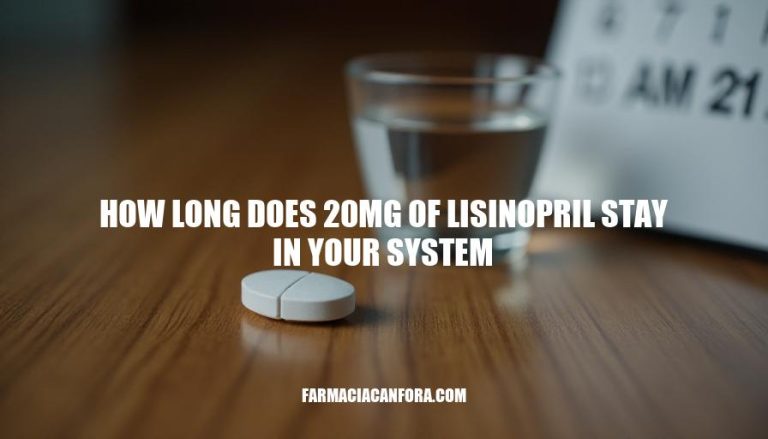


Lisinopril is an oral medication commonly prescribed for managing high blood pressure and heart failure. It belongs to a class of drugs called ACE inhibitors, which work by relaxing blood vessels to improve blood flow. This introduction will explore the duration that a 20mg dose of lisinopril stays in the body, focusing on its half-life and overall presence within the system.
Lisinopril, an ACE inhibitor, has a half-life of approximately 12 hours, meaning it takes about 12 hours for the concentration of the drug in the bloodstream to be reduced by half. Several factors influence how long 20mg of lisinopril stays in your system:
Metabolism: Lisinopril is not extensively metabolized by the liver. Instead, it is excreted unchanged in the urine.
Therefore, metabolic rate variations have minimal impact on its duration in the system.
Age: Age can affect the pharmacokinetics of lisinopril. Older adults may experience slower drug clearance, leading to prolonged presence in the system.
Kidney Function: Since lisinopril is primarily excreted by the kidneys, impaired kidney function can significantly affect its elimination. Reduced glomerular filtration rate (GFR) can lead to decreased clearance and longer duration in the system.
Dosage Consistency: Consistent daily dosing helps maintain steady-state levels of lisinopril in the bloodstream.
Irregular dosing can lead to fluctuations in drug concentration and effectiveness.
These factors collectively determine the duration and effectiveness of lisinopril in managing conditions such as hypertension and heart failure.
Lisinopril has an elimination half-life of approximately 12 hours. Clinical studies indicate that after oral administration of a 20mg dose, the drug reaches peak plasma concentration within about 6 to 7 hours. The duration of action for lisinopril is around 24 hours, meaning it effectively lowers blood pressure for a full day after a single dose.
Elimination half-life refers to the time it takes for the concentration of a drug in the body to be reduced by half. This concept is crucial in pharmacokinetics as it helps determine the dosing frequency and duration of a drug’s effect.
For lisinopril, a medication used to treat high blood pressure and heart failure, the elimination half-life is approximately 12 hours. This means that after taking a dose of lisinopril, it takes about 12 hours for the concentration of the drug in the bloodstream to decrease by half.
Therefore, a 20mg dose of lisinopril would be reduced to 10mg after 12 hours, 5mg after 24 hours, and so on.
Understanding the half-life of lisinopril is important for managing its therapeutic effects and ensuring consistent blood levels to maintain its efficacy. Typically, lisinopril is prescribed once daily to maintain a steady state in the body.
Lisinopril, an ACE inhibitor used to manage high blood pressure and heart failure, has a half-life of approximately 12 hours. This means that after taking a dose, it takes about 12 hours for the concentration of the drug in the bloodstream to decrease by half.
Several factors influence how long 20mg of lisinopril stays in the system, including metabolism, age, kidney function, and dosage consistency. Older adults may experience slower drug clearance, while impaired kidney function can lead to decreased clearance and longer duration in the system.
Consistent daily dosing helps maintain steady-state levels of lisinopril in the bloodstream. The elimination half-life is crucial in pharmacokinetics as it determines the dosing frequency and duration of a drug’s effect.
Lisinopril has an effective duration of action for around 24 hours, making it suitable for once-daily dosing. Understanding the half-life of lisinopril is essential for managing its therapeutic effects and ensuring consistent blood levels to maintain its efficacy.
It is recommended to consult healthcare professionals for personalized advice on managing high blood pressure and heart failure with lisinopril.